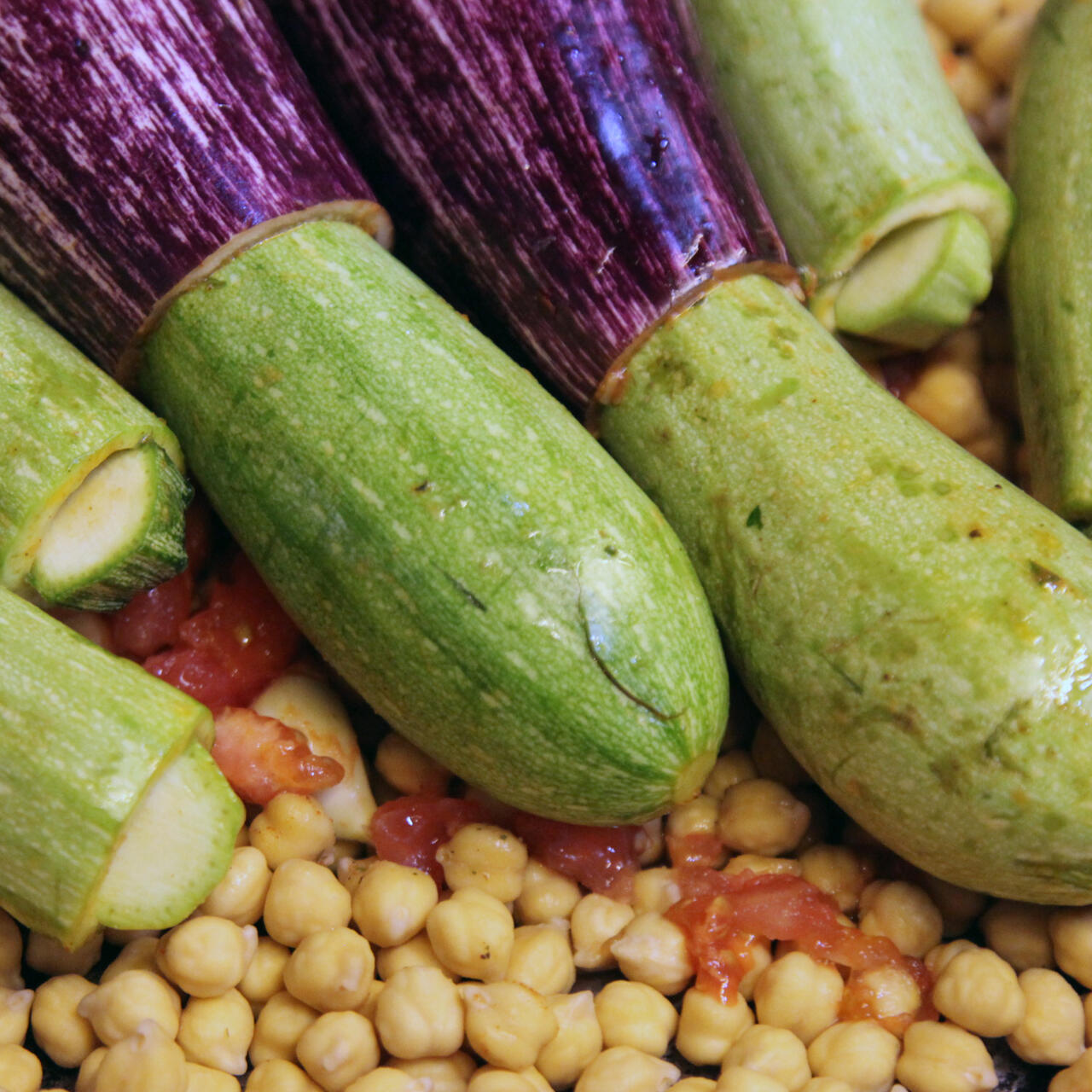
Food is universal. No matter where in the world you are, food is a way to bring communities together. It connects people. Sharing a recipe can be as powerful as sharing your story. Join us and cook with refugees from around the world as they share their recipes from home.
In 2021, the IRC held cooking workshops for refugee and Greek women living on the Island of Lesvos, Greece. The workshops brought together local and refugee women, to promote common experiences and mutual understanding through the universal language of food. The women shared recipes that were personal to them and reminded them of home.
Meet Jacqueline, who tells us about her vegan mahshi.
Jacqueline’s vegan mahshi recipe
Jacqueline came to Greece two years ago with her brother to claim asylum. She now lives in Mavrovouni refugee camp on the island of Lesbos.
“I want to stay in Greece”, says Jacqueline, who is Kurdish and from Syria, “because I feel like [I’m at] home here.”
Jacqueline is taking Greek classes organised by the IRC twice a week. She was nervous about starting the language class. “At first, I didn’t want to begin, I was afraid, but after some classes with Maria [her teacher], I felt really comfortable.”
As Jacqueline waits for a decision on her asylum claim, preparing food has brought her joy.
“I want to be happy; this means cooking for other people.”
And her delicious meals have proved very popular.
“I cooked for people inside the camp in Moria and everyone loved the food, so word spread out for my cooking”, she says. “I have since cooked for the management of the camp in Lesvos and NGO visitors.”
One of Jacqueline’s recipes is for Mahshi - a vegan meal made up of stuffed vegetables with rice.
“This recipe is for special guests, when you want to spoil them and show a hospitality gesture! For us Kurds, the longer a dish gets to be ready, the more you show to your guests how you appreciate them.”
Jacqueline, who lost her parents when she was young, taught herself how to make the dish.
Read the cookbook: Recipes from Home
She says she is like a mother in the camp: “I cook for everyone who doesn’t know how to cook.”
It’s not easy for Jacqueline to prepare food in the camp’s “complicated” conditions, which include sharing a tent with four other people.
“In the camp, I can only cook when there is electricity,” she explains.
“Living in a tent, I am adapting my cooking to two hours of electricity, and I have to prepare everything beforehand.”
But sharing meals can create a sense of community, Jacqueline says.
“I love making foods to bring people together, laugh, eat, and create connections.”
Follow the steps below to learn how to make Jacqueline’s vegan Mahshi.
Ingredients:
- 500 g rice
- Olive oil
- 1 can of tomato paste
- 1 can of chickpeas
- 1 seasoning cube (Vegetable or chicken flavour)
- 1 parsley bouquet
- 2 onions
- 1 kg tomato
- ½ kg lemon
- 3 aubergines
- 3 courgettes
- 6 green peppers
- 3 potatoes
- 2 lemons
- 1 tablespoon of ground coriander
- 1 tablespoon of cumin
- 1 tablespoon of black pepper
- 1 tablespoon of dried mint
- 1 tablespoon of hot paprika
- Salt
Steps:
- Wash the vegetables, cut off the tops and hollow them out with a knife. Be careful not to break any. Set aside until the stuffing step.
- Keep the tops of the vegetables to be used later, during the stuffing.
- Wash the rice and cover it with warm water. Let it rest for at least 15-30 minutes.
- Once the rice is well-rested, drain the water and add all spices (salt, black pepper, paprika, cumin, coriander, etc.) to the rice. The quantity of the spices depends on your pallet.
- Peel and crush the garlic and add it to the rice mixture.
- Add the juice of one lemon and two tablespoons of tomato paste to the mix.
- Chop a couple of tomatoes and green peppers and add them to the rice.
- Wash and chop the parsley and add it in the mix.
- Add the dried mint and half a cup of olive oil.
- Mix the rice stuffing until all the ingredients blend in together.
- Add room temperature water bit by bit while mixing, until the stuffing is workable (the water would help the rice cook better inside the vegetables).
- Stuff the hollowed-out vegetables with the rice mix. The amount of stuffing should be up to half of the vegetable to allow room for the rice to level while cooking.
- Place the tops as a cover to keep the mix from leaking out during the cooking part.
- Pick a pan wide enough to contain all the stuffed vegetables, plus the sauce.
- Put the chickpeas as a first layer to prepare a bed for the vegetables, throw in some garlic cloves and lemon slices prepared beforehand plus a thin layer of olive oil.
- Place the vegetables in a way to keep them in place during the cooking.
- Place some more garlic and lemon slices around the vegetables.
- Mix the tomato paste with 1lt of hot water and pour it on top of the vegetables, the sauce needs to cover the stuffed vegetables.
- If the prepared sauce isn’t enough, add hot water to compensate.
- Throw in the seasoning cube.
- To ensure that the vegetables stay put during the boiling phase, cover them with a large plate and place a casserole filled with water on top.
- Cook at high heat for 40 minutes and then with a fork, poke the vegetables to assess their cooking every 15 minutes.
- Each time you check, watch out for the sauce level. If it decreases, add hot water in small intakes to help balance it.
- The dish takes about 1 to 1h 30 until full cooking. When ready, let it rest in the pan for about 15-20 minutes to allow the sauce to thicken.


